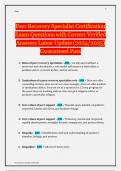1
Peer
Peer Recovery Specialist Certification
Exam Questions with Correct Verified
Answers Latest Update (2024/2025)
Guaranteed Pass
1. Roles of peer recovery specialists - ANS ✓An ally and confidant, a
motivator and cheerleader, a role model and mentor, a truth teller, a
problem solver, resource broker, and an advocate.
2. Limitations of a peer recovery specialists role - ANS ✓Does not offer
counseling services, does not act as a case manager, does not offer medical
or medication advice, does not act as a sponsor in a 12 step program for
the peers they are working with us, does not give religious advice or
promote a particular religion.
3. Core values of peer support - ANS ✓Hopeful, open-minded, empathetic,
respectful, honest and direct, and facilitate change.
4. Core values of peer support - ANS ✓Voluntary, mutual and reciprocal,
equally shared power, strengths focused, transparent, and person driven.
5. Empathy - ANS ✓Identification with and understanding of another's
situation, feelings, and motives.
6. Empathize - ANS ✓talk less & listen more
Peer Recovery Specialist Certification
, 2
Peer
7. Person centered, non-judge mental, & empowering language - ANS
✓My experiences, what's happened to me, people I work with, I'm here to
learn with you, risking new thinking and behavior, and change patterns.
8. Effective listening - ANS ✓Focus attention on speaker, avoid distractions,
sit appropriately close to speaker, acknowledge emotional state, set aside
prejudices & opinions, be other directed & focus on person
communicating, following understand speaker as if I was in their shoes, be
aware, listen with my ears but also with my eyes and other senses, don't
interrupt, be involved and engaged.
9. Barriers to effective listening - ANS ✓Assuming unknown know what
the other person is thinking, listening selectively, jumping to conclusions,
letting my mind wander, working on a response or solution while peer is
still talking, changing the subject before the peer is done, & automatically
agreeing before understanding completely.
10. motivational interviewing - ANS ✓Gives a framework for having
conversations to bring out a persons own internal motivation and
thoughts about changing hey specific health behavior.
11. motivational interviewing - ANS ✓To guide the person to
recognizing & solving their own challenges with changing a behavior.
12. Principals of motivational interviewing - ANS ✓Changes up to
the person, express empathy and acceptance, hope the person recognize
discrepancies between goals and current behavior, avoid confrontation,
support peers believe in their abilities to succeed in accomplishing a task
and encourage optimism.
13. motivational interviewing - ANS ✓Non-judgmental process
designed to help build the peers self efficacy. It involves working with the
peer to develop a step by step change plan.
Peer Recovery Specialist Certification




